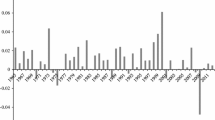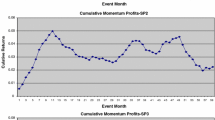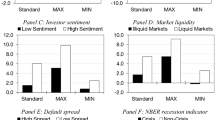Abstract
The main purpose of this paper is to investigate whether capital investment can affect stock price momentum. We provide empirical evidence that momentum strategies tend to be more profitable for stocks with large capital investment or investment changes. We present a simple explanation for our empirical results and show that our finding is consistent with the behavioral finance theory that characterizes investors’ increased psychological bias and the more limited arbitrage opportunity when the estimation of firm value becomes more difficult or less accurate.
Similar content being viewed by others
Notes
The web-address is: http://mba.tuck.dartmouth.edu/pages/faculty/ken.french/data_library.html.
We would like to thank one referee for suggesting this analysis.
We would like to thank one referee for suggesting this analysis.
References
Barberis N, Thaler R (2003) A survey of behavioral finance. In: Constantinides GM, Harris M, Stulz R (eds) Handbook of the economics of finance, Chap. 18. Elsevier, North-Holland
Chan KC, Jegadeesh N, Lakonishok J (1996) Momentum strategies. J Finance 51:1681–1713
Chordia T, Shivakumar L (2006) Earnings and price momentum. J Financ Econ 80:627–656
Daniel K, Hirshleifer D, Subrahmanyam A (1998) Investor psychology and security market under- and over-reaction. J Finance 53:1839–1886
Daniel K, Hirshleifer D, Subrahmanyam A (2001) Overconfidence, arbitrage, and equilibrium asset pricing. J Finance 56:921–965
Fairfield P, Whisenant J, Yohn T (2003) Accrued earnings and growth: implications for future profitability and market mispricing. Account Rev 78:353–371
Fama EF, French KR (1992) The cross-section of expected stock returns. J Finance 47:427–465
Fama EF, French KR (1993) Common risk factors in the returns on stocks and bonds. J Financ Econ 33:3–56
Griffin D, Tversky A (1992) The weighing of evidence and the determinants of confidence. Cogn Psychol 24:411–443
Griffin JM, Ji X, Martin S (2005) Global momentum strategies. J Portfolio Manag 31:23–39
Gu L, Huang D (2010) Sales order backlogs and momentum profits. J Bank Finance 34:1564–1575
Hirshleifer D (2001) Investor psychology and asset pricing. J Finance 56:1533–1597
Hirshleifer D, Hou K, Teoh S, Zhang Y (2004) Do investors overvalue firms with bloated balance sheets? J Account Econ 38:297–331
Hoitash R, Krishnan M (2008) Herding, momentum and investor over-reaction. Rev Quant Finance Account 30:25–47
Jegadeesh N, Livnat J (2006) Revenue surprises and stock returns. J Account Econ 41:147–171
Jegadeesh N, Titman S (1993) Returns to buying winners and selling losers: implications for stock market efficiency. J Finance 48:65–91
Kaplan SN, Zinglales L (1997) Do investment-cash flow sensitivities provide useful measures of financing constraints? Q J Econ 112:169–215
Lee CMC, Swaminathan B (2000) Price momentum and trading volume. J Finance 55:2017–2069
Mitchell M, Pulvino T, Stafford E (2002) Limited arbitrage in equity markets. J Finance 57:551–584
Odean T (1998) Volume, volatility, price, and profit when all traders are above average. J Finance 53:1887–1934
Sagi JS, Seasholes MS (2007) Firm-specific attributes and the cross-section of momentum. J Financ Econ 84:389–434
Shleifer A, Vishny RW (1997) The limits of arbitrage. J Finance 52:35–55
Sloan R (1996) Do stock prices fully reflect information in accruals and cash flows about future earnings? Account Rev 71:289–315
Titman S, Wei K, Xie F (2004) Capital investments and stock returns. J Financ Quant Anal 39:677–700
Yen G, Lee CF (2008) Efficient market hypothesis (EMH): past, present and future. Rev Pac Basin Financ Markets Policies 11:305–329
Author information
Authors and Affiliations
Corresponding author
Rights and permissions
About this article
Cite this article
Jiang, G., Li, D. & Li, G. Capital investment and momentum strategies. Rev Quant Finan Acc 39, 165–188 (2012). https://doi.org/10.1007/s11156-011-0250-3
Published:
Issue Date:
DOI: https://doi.org/10.1007/s11156-011-0250-3




